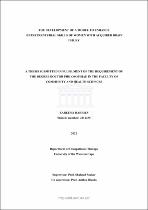The development of a model to enhance entrepreneurial skills of women with acquired brain injury
Abstract
Acquired brain injury (ABI) is a major public concern since the consequences thereof are far reaching as the long-term effects can be different for each individual and can impact on their lives in different ways. Individuals with ABI can experience both short-term and long-term cognitive, emotional, physical as well as behavioural changes that can make community reintegration and resumption to work more challenging. The particularly low return to work (RTW) outcomes for individuals sustaining ABI have been well documented, showing that women with ABI are at a greater risk of not returning to work compared to men with ABI. In the last decade South Africa demonstrated a disability prevalence rate of 7.5%, indicating that disability was more prevalent among women compared to men. As a result of the limited opportunities in the formal labour market in South Africa, opportunities for women in general and those with ABI entering the job market remains low.

